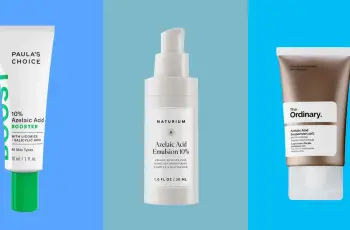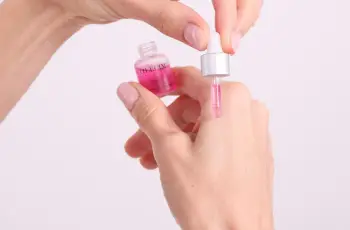
Azelaic Acid vs. Benzoyl Peroxide for Acne Treatment: Similarities, Differences, and How to Choose Between Them
Azelaic acid and benzoyl peroxide are two ingredients commonly recommended for acne-prone skin, but how do they differ? Is one more effective than the other?
Learn about the similarities and differences between the two substances and how to determine which one is right for you.
What is Azelaic Acid?
Azelaic acid is a dicarboxylic acid found in grains such as wheat, barley, and rye. It has antimicrobial and anti-inflammatory properties, making it a common choice for treating acne, hyperpigmentation, rosacea, and mild skin irritations. Azelaic acid also has powerful antioxidant effects that help neutralize free radicals that cause environmental damage to all skin types, including sensitive skin. With its antimicrobial and anti-inflammatory effects, the naturally occurring acid helps eliminate acne-causing bacteria on the skin while breaking the link between elevated testosterone levels and other hormonal changes, thereby minimizing hormonal breakouts.
Benefits of Azelaic Acid
The benefits of Azelaic Acid include:
Clinically proven to reduce acne1
Clinically proven to reduce rosacea lesions2
Relieves irritation and redness
Kills bacteria on the skin, reducing and healing acne breakouts
Brightens complexion
Opens clogged pores and removes dead skin cells
Improves skin texture
Reduces fine lines and wrinkles
Lightens acne scars and hyperpigmentation
Minimizes hormonal breakouts
Gentle enough for sensitive skin
What is Benzoyl Peroxide?
Benzoyl peroxide is a topical antiseptic that treats acne by releasing free radicals into the skin to kill acne-causing bacteria. It has mild sebum-inhibiting and keratolytic properties, meaning it inhibits excess oil production and dissolves skin flakes and lesions. 3 These actions help clear acne, but can cause dry and flaky skin. Like azelaic acid, benzoyl peroxide is a powerful anti-inflammatory agent that helps reduce redness and irritation, as well as other skin conditions like rosacea.
Benzoyl Peroxide Benefits
Benefits of benzoyl peroxide include:
Clinically proven to reduce acne4
Clinically proven to reduce rosacea lesions5
Soothes inflamed skin
Controls oil production
Clears clogged pores
Exfoliates dead skin cells
Azelaic Acid vs. Benzoyl Peroxide
Clinical studies have shown that topical azelaic acid is just as effective as benzoyl peroxide and other popular acne treatments, such as topical retinoids, erythromycin, and oral tetracycline, in reducing acne.6 However, azelaic acid is known to be much gentler on the skin than other products, is less harsh on the skin, does not cause peeling or irritation, and does not make the skin more sensitive to the sun.
Discover more similarities and differences between azelaic acid and benzoyl peroxide below.
Azelaic Acid 14% Cream
Azelaic Acid 14% Cream
• Reduces acne and rosacea
• Brightens skin tone and fades brown spots
• Unclogs pores and improves skin texture
Regular Price $45
Add to Cart
Similarities
Azelaic Acid and Benzoyl Peroxide:
Clinically proven to reduce acne and rosacea
Have antimicrobial properties, killing bacteria on the skin
Exfoliates, unclogs pores, removes dead skin cells
Relieves inflammation, reduces redness and swelling
Differences
They appear to work the same, but what is the difference between azelaic acid and benzoyl peroxide? Quite a few, it turns out. Although azelaic acid shares similarities with acne and has been shown to be effective in treating acne, azelaic acid is considered gentler, making it a suitable choice for those with sensitive skin. Benzoyl peroxide is known to cause flaking and irritation, and can dry out the skin when trying to prevent excess oil. The ingredient also has bleaching properties, which can affect hair and clothing if used incorrectly. You are more susceptible to sun damage when using benzoyl peroxide, so it is important to use sunscreen and protective clothing or avoid sun exposure.
Another important difference between azelaic acid and benzoyl peroxide is that azelaic acid promotes the skin’s cell renewal process and stimulates collagen production to heal and repair damaged skin. Azelaic acid is also an antioxidant, which means it reduces free radicals in the skin. For these reasons, azelaic acid can be used to reduce fine lines and wrinkles. On the other hand, benzoyl peroxide actually promotes free radicals in the skin, and repeated use may cause sunburn-like changes in the skin. 7
Can Azelaic Acid and Benzoyl Peroxide Be Used Together?
There may be benefits from using azelaic acid and benzoyl peroxide together. Some studies show that using azelaic acid and benzoyl peroxide together is actually more effective than using benzoyl peroxide alone. 8
Due to its antioxidant properties, using azelaic acid can also counteract or neutralize the potential damage of free radicals released by benzoyl peroxide.
When and how should you use azelaic acid compared to benzoyl peroxide?
Both azelaic acid and benzoyl peroxide can be used once or twice daily, depending on your skin type and condition. When using both ingredients together, it is recommended to cleanse the skin first, moisturize, apply benzoyl peroxide first, and apply azelaic acid last. Whether you use azelaic acid or benzoyl peroxide or both, always use an SPF 30 or higher sunscreen afterwards. Although azelaic acid offers stronger protection and will not make you more sensitive to the sun, it is still recommended that you use a sunscreen to protect your skin and health.
Developed by dermatologists and chemists, Base Skincare Azelaic Acid 14% Cream has the highest over-the-counter azelaic acid content. Formulated with a moisturizer base, this product layers well with other ingredients without causing irritation or pilling. It is especially useful when used with drying ingredients like benzoyl peroxide because it can help moisturize the skin.
Other products you may want to add to your acne treatment routine include FS Niacinamide Lotion 10% (to soothe skin and aid DNA repair), FS Hyaluronic Acid Lotion (to lock in moisture), and Night Renewal Cream with 2% Granactive™ Retinoid (to improve overall texture).
Key Insights
In summary, azelaic acid is good for acne, but so is benzoyl peroxide. Both kill acne-causing bacteria on the skin, reduce inflammation, and open clogged pores while removing dead skin cells. However, when it comes to the differences between azelaic acid and benzoyl, there are some important distinctions to remember: Azelaic acid is a powerful antioxidant, while benzoyl peroxide promotes the production of free radicals in the skin. While azelaic acid is gentle enough to be used on the most sensitive skin, benzoyl peroxide may cause flaking and redness and may dry out the skin.
If you’re still unsure which product to use, we recommend starting with azelaic acid as a gentler option. Then, if you need more help, you can also use benzoyl peroxide as a spot treatment along with other acne-fighting ingredients in your basic skincare line.


